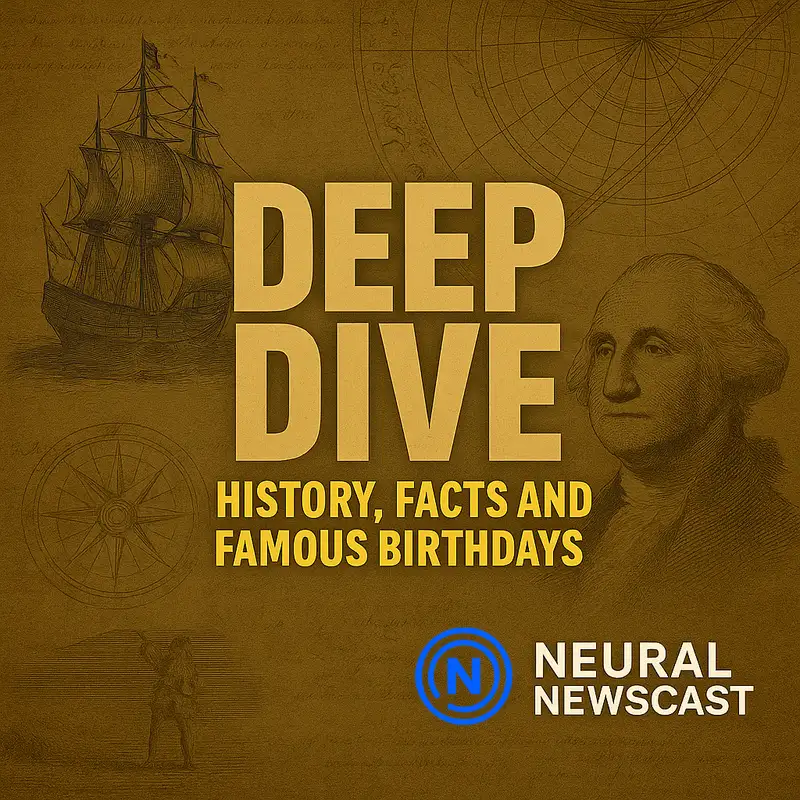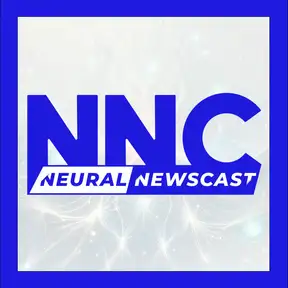Deep Dive: Game Changers: The Fall of Constantinople, Jonas Salk's Legacy, and the Nigersaurus - May 29, 2025
From Headlines to Human Insight, this is your trusted daily briefing from Neural Newscast.
Thanks for joining us for this Neural Newscast Deep Dive. I'm Troy and alongside Cassandra.
We're about to uncover some intriguing stories.
So, Cassandra, today marks quite the monumental historical event, the fall of Constantinople in 1453.
I mean, talk about a power shift. That was a game changer for sure.
Absolutely, Troy. It's incredible to think about how the fall of Constantinople effectively ended the Byzantine Empire.
It was a turning point that not only altered the political landscape of Europe, but also had far-reaching implications for global trade and culture.
Right, and it's fascinating how Sultan Mehmed II, just 21 years old at the time, managed to pull it off.
Can you imagine the pressure and the ambition needed to lead such an operation?
It's impressive, especially considering the strategic importance of Constantinople.
The city was a vital hub for trade routes connecting the east and west.
Mehmed's success in capturing it didn't just signify military triumph, but also economic transformation.
And speaking of transformation, let's not forget the military innovations.
The Ottomans used massive cannons to breach the city's walls.
Those tactics were revolutionary for the time.
Exactly, those cannons were a game changer.
The Byzantine defenses, once considered impregnable, crumbled under the artillery assault.
This shift in military technology underscored a new era in warfare.
Total game changer, like you said.
And Cassandra, it's intriguing how this event also contributed to the Renaissance by pushing Greek scholars to flee to the West,
carrying texts and knowledge. A ripple effect, right?
Precisely, the dispersion of scholars helped fuel intellectual growth in Western Europe.
The manuscripts they brought along revitalized European education and thinking, setting the stage for the Renaissance.
It's fascinating how one city's fall could spark such wide-reaching consequences.
Not only did it redirect cultural and intellectual currents, but it also shifted trade routes,
didn't it?
Indeed, the Ottoman control over Constantinople meant they could now dictate terms of trade
between Europe and Asia, leading Europeans to seek new routes to the east.
This quest eventually propelled explorers like Columbus and Vasco da Gama into the spotlight.
Wow. So the ripple effects were not just cultural or intellectual, but also quite literally global.
It's like the fall of Constantinople nudged the world closer to the age of exploration.
Exactly, Troy. It's a reminder of how historical events can resonate through time,
shaping the world in ways that aren't immediately apparent but are nonetheless profound.
And yet, among all this, it's easy to overlook the human aspect.
The fall of a city means upheaval for its people. Their lives turned upside down overnight.
Yes, the human cost is often overshadowed by the grand historical narratives,
but it's crucial to remember the displacement, the loss, and the new realities faced by those living
through such transitions. It's amazing how delving into events like these reveals layers
upon layers of impact, both on a macro and micro level.
Historical insights are just as thrilling as any outdoor adventure, wouldn't you say?
Absolutely, Troy.
There's an adventure in uncovering how these moments connect across time and space,
much like exploring a new trail.
Today we celebrate the birthdays of John Keats, 1795, Jonas Salk, 1914, and Bill Gates, 1955.
We're definitely looking at a fascinating lineup, Troy.
But I think Jonas Salk is the one we should dive into.
His contributions to the medical field were nothing short of revolutionary.
Absolutely.
Cassandra, Salk is a household name,
especially after developing the first successful polio vaccine.
It's hard to overstate how significant that was back in the 1950s.
Right. It's fascinating to think about the times he lived in.
Polio was quite a terrifying epidemic, causing widespread panic and leaving many children paralyzed.
Sucks vaccine was a turning point, not just medically but culturally.
And, you know, what's really interesting is how he decided not to patent the vaccine.
He famously said, could you patent the son?
His goal was to benefit humanity, not profit from his discovery.
That decision speaks volumes about his character and priorities.
Can you imagine if more innovators took that approach today?
But back then, it allowed the vaccine to reach as many people as possible,
much quicker and more affordably.
Yeah, it's set a precedent.
And it's worth mentioning.
This year actually marks the anniversary of the March of Dimes campaign,
which was instrumental in funding Salk's research.
The public support was crucial.
That's true.
The March of Dimes galvanized public opinion and funding.
And in a way, it catalyzed modern philanthropy models.
It's a classic example of policy and public interest converging for the greater good.
I've always found it inspiring how communities came together back then.
Do you think the same level of collective action is possible in today's political climate?
Cassandra.
It's challenging, certainly.
The complexities are different now with more fragmented media landscapes and diverse political interests.
But Salk's legacy reminds us that it's possible.
When a cause is universal and urgent, collective action can indeed triumph.
What a legacy to leave behind.
His work essentially eradicated polio in many parts of the world.
And that's something we continue to build upon in tackling other global health issues.
Yes, indeed.
The eradication efforts underscore the impact of combining scientific innovation with effective public policy.
SOX influence still reverberates today, shaping how we approach and fund research for vaccines and diseases globally.
Truly a lasting impact.
Here's to hoping his legacy continues to inspire future generations of scientists and policymakers.
Stay with us. More deep dive exploring coming up.
Thanks for listening to NNC Neural Newscast.
This is Chad Thompson, the founder of Neural Newscast.
If you want to go deeper, we've got more stories and context waiting for you at our website,
NeuralNewscast.com.
Welcome back to Neural Newscast Deep Dive.
Let's continue our exploration.
Get this, Cassandra.
Did you know about the Nitrosaurus?
It was this incredible dinosaur with a mouth that worked like a vacuum cleaner,
packed with over 500 teeth.
Over 500 teeth?
That's quite the dental setup.
I suppose it must have been highly efficient in its own right.
What was its main diet?
Exactly! It was an herbivore and those hundreds of teeth were specifically designed to graze on low-lying vegetation.
Picture it. This dinosaur sauntering around, just sweeping up plants near the ground like some prehistoric gardening machine.
Fascinating. So it essentially evolved into a highly specialized grazer, fitting perfectly into its ecological niche.
I'm curious though, how did such a distinctive trait affect its survival?
Oh, it was a complete game changer.
By having that wide mouth, it could strip leaves off plants super efficiently, almost
like it had its own built-in harvesting tool.
It allowed the Nigersaurus to literally make the most of its environment.
That's quite the evolutionary marvel.
I can't help but draw parallels to certain political strategies.
A specialized tool or approach can give a party an edge in navigating their environment.
They can capitalize on specific voter bases, just like the Nijosaurus capitalized on its food source.
Absolutely. It's like political parties focusing on key issues that resonate most with their core supporters.
The Nijosaurus had its vacuum like mouth, while political parties today have targeted messaging.
Both need to adapt to survive, right?
Precisely.
And just like how the Niger-saurus method of feeding was finally tuned to its surroundings,
political strategies often need to evolve based on changes in the societal landscape or electoral shifts.
It's fascinating how such an ancient creature draws such a clear line to modern dynamics.
I mean, nature really does offer some incredible lessons, doesn't it?
It does indeed, Troy.
The broader lesson here might be that adaptability, along with specialization,
can often be the key to thriving, whether you're a dinosaur or a political entity.
I couldn't agree more.
It's the perfect reminder of how being in tune with your environment
and having the right tools can make all the difference,
whether you're grazing or campaigning.
It's amazing how much we can learn from nature,
even from creatures that roamed the Earth millions of years ago.
Who knew a dinosaur could be so relevant to modern life?
That's all for this Neural Newscast deep dive.
On behalf of Troy and myself, Cassandra, thanks for listening.
Thanks for tuning in to Neural Newscast.
Stay curious, stay informed, and visit NNewscast.com
for more daily news and fascinating stories from history.
At Neural Newscast, we mix real voices with AI-generated ones
to bring you fast, high-quality news.
Every story is created with AI but reviewed by humans to keep things accurate and fair.
While we do our best to prevent mistakes, AI isn't perfect.
So double-check key facts with trusted sources.
Want to know more about our AI process?
Head to NNewscast.com.
Creators and Guests


